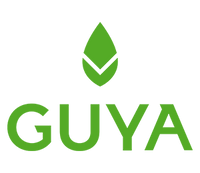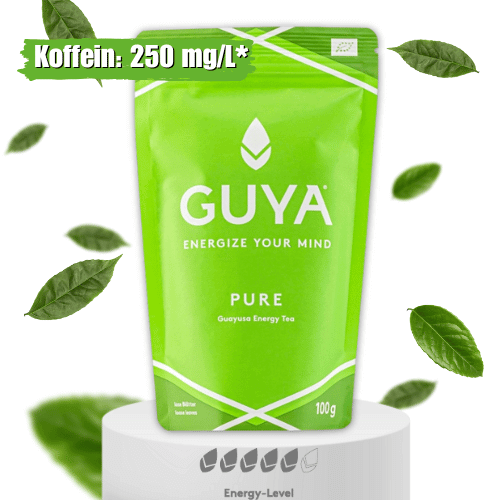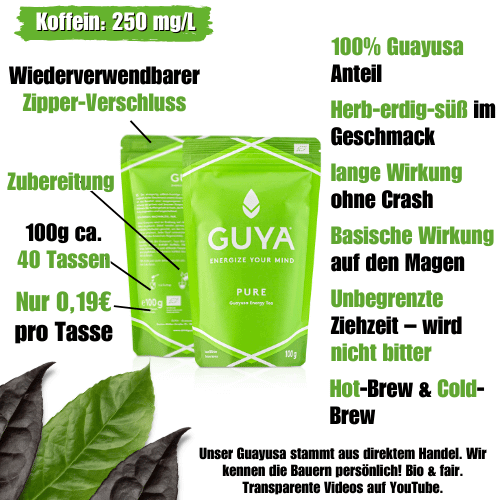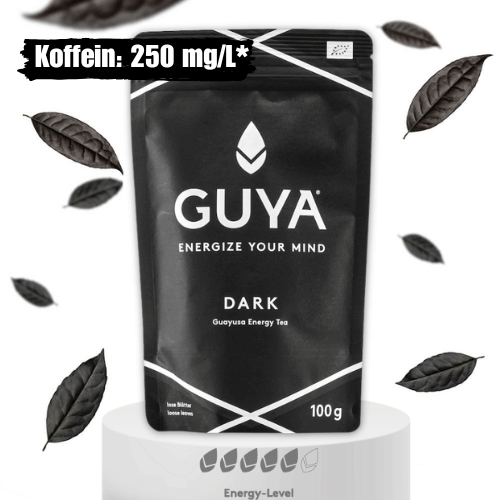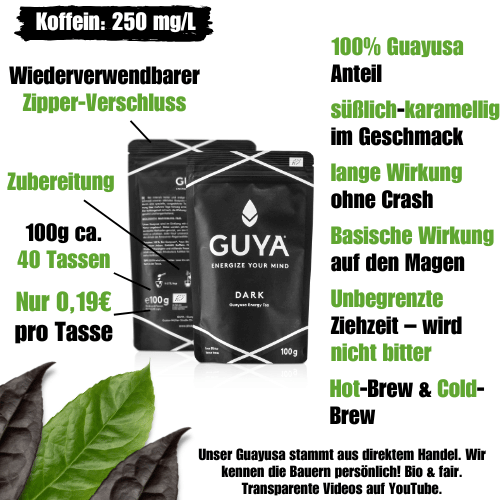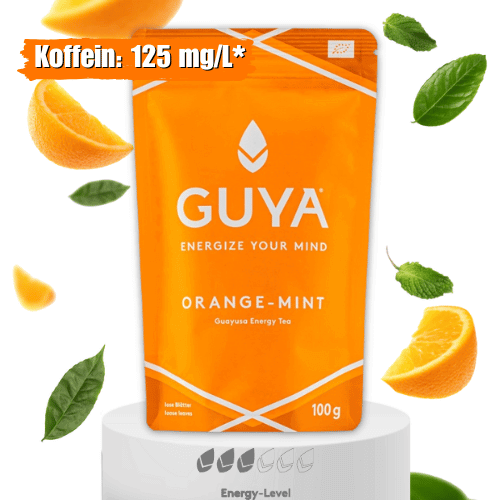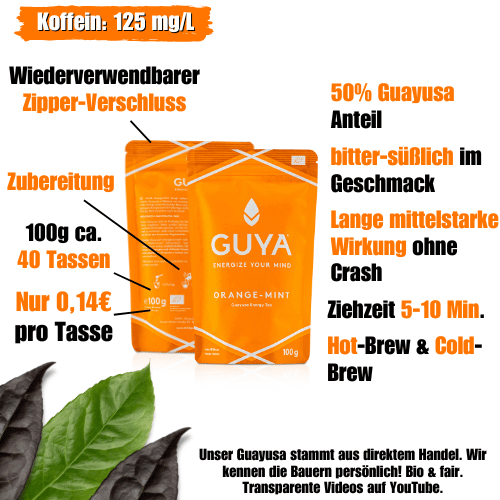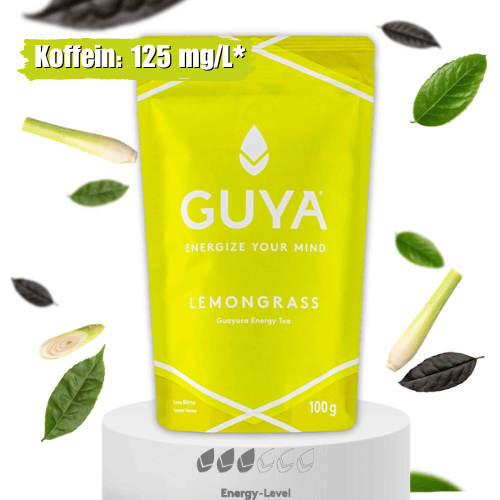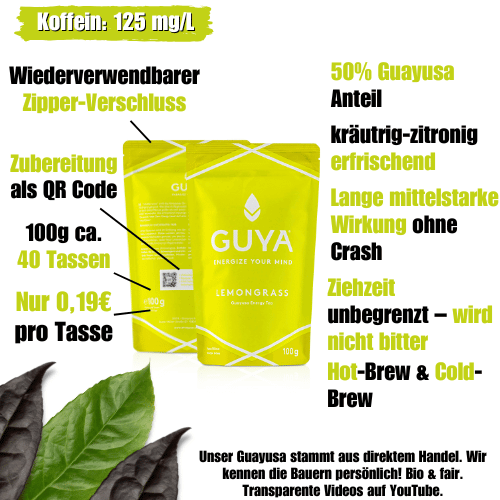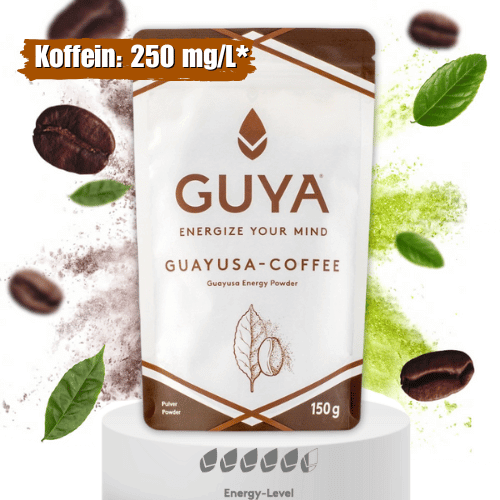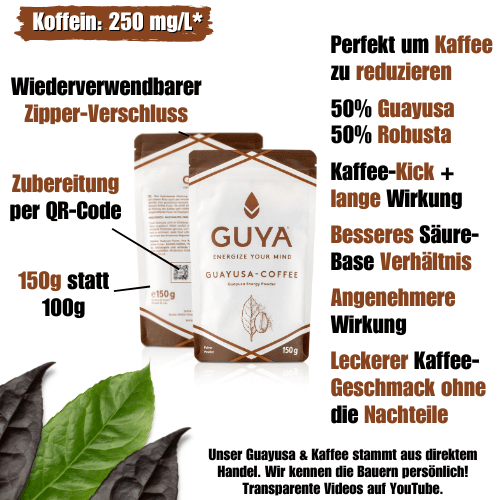Organic Guayusa Tea - what does organic cultivation mean?

Introduction
Again and again we are asked whether our Guayusa biologically grown. Yes GUYA Guayusa Tea is organic Guayusa!
But what does it actually mean to grow biologically? After all, organic is not the same. We want to bring light into the dark and explain to you what we look out for so that our Guayusa Really organic is-because there are big differences, especially in organic cultivation.
Our cultivation method for organic Guayusa For example, differs fundamentally to other biological cultural methods such as those of Yerba Mate, coffee and cocoa and we even exceed the standards of organic associations such as Organic and Demeter!
On our YouTube channel you will find detailed documentation and interviews with farmers to grow Guayusa, Lemon grass, Coffee and ours Afforestation project in Ecuador.
Contents:
- What does organic actually mean?
- The problem of organic monocultures - deceptive appearance!
- Cultivation methods and their differences
- Conventional cultivation
- Integrated production, not organic, but efficient
- State -controlled biological cultivation
- Biological association cultivation - what does organic mean in associations?
- Bio permaculture - the organic Guayusa-Tee cultivation
- The cultivation of organic Guayusa
- Organic Guayusa - Our organic certificate
1. What does organic actually mean?
Bio means the biological or ecological production, in which no artificial elements flow into the value chain - the production and raw materials are of course. It is important to know that it is not a precise definition giveswhat "of course" and what is "artificial". In the cultivation of organic Guayusa were Seen in this way, the use of copper -containing fungicides allowed. In the cultivation of organic apples, the use of copper-containing fungicides is made, e.g.
Copper is of course of natural origin, but it is not particularly nice to spray the plants and the soil with copper year after year.
2. The problem of organic monocultures - deceptive appearance!
In the meantime it is well known, organic cultivation is not necessarily Sustainable and environmentally friendly. Bio coffee comes e.g. just like Yerba Mate, cocoa, green tea, bananas, coconuts ... mostly from huge monoculture plantations. In organic monocultures, it is fertilized according to organic guidelines, but the cut in the natural landscape is huge.
Animal and plant variety cannot be found in this type of organic culture guide. The soil in these areas is contaminated and at risk of erosion. It is only populated by a species and smaller crops that could grow under the cocoa trees or mate trees are usually removed.
The use of pesticides is also not prohibited in organic cultivation. It is only heavily regulated and limited to a few means. In organic monocultures, the use of such means is significantly higher than in an organic permaculture due to the mushroom inheritance of many plants.
So organic does not necessarily mean creating a natural environment. The organic seal only "guarantees" the omission of chemical organic (artificial) pesticides and fertilizers. However, according to guidelines, it does not matter whether rainforest is cut down or the variety of animal and plant variety is wiped out or reduced in the cultivation area!
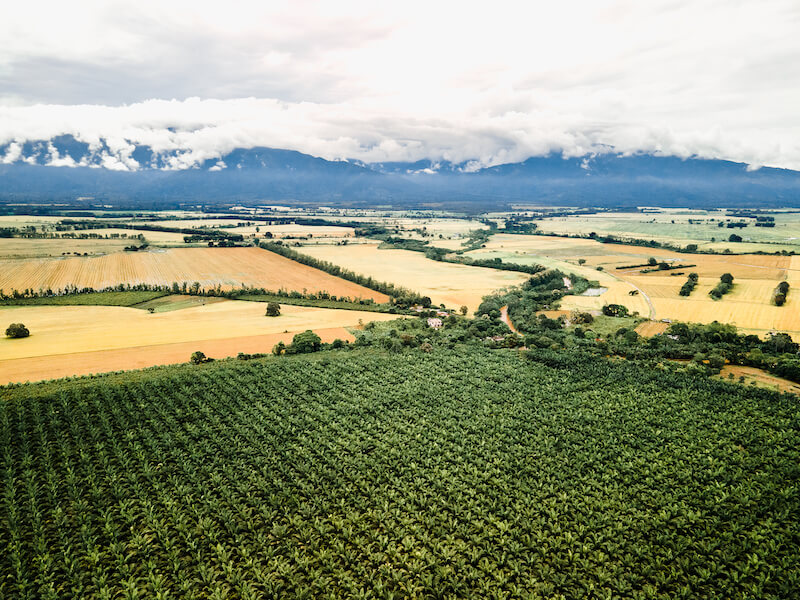
3. Cultivation methods and their differences
There are different organic bio methods with different seals. In the following you will find detailed explanations on the individual methods.
3.1. Conventional cultivation
Conventional agriculture is still the most widespread economic form. It uses the fertilizers and plant protection products approved by the responsible authorities in agriculture. The agricultural law and EU regulations act. Residue values on the food are determined centrally by the EU. As a consumer, you can pay attention to seasonal and regional products with regard to a better ecological balance, which in principle also have a lower CO2 and water footprint. Of course, the origin is important, because at the time of the potato there can also be imports from Africa that are cheaper than products from Europe!
3.2. Integrated production, not organic, but efficient
The IP extension is, so to speak, the link between conventional cultural management and the biological cultivation. There is a lot of strict with pesticides and fertilizer. On the one hand, the IP extension increasingly pays attention to natural and animal-friendly cultivation, and on the other hand it integrates technological progress.
Many products such as tomatoes, peppers, zucchini, cucumbers, salads, come from "integrated production". These often take place in greenhouses that are designed for efficiency. The recycling of water, heat and plant remains is a great advantage in integrated cultivation. The degree of recycling is in modern greenhouses in the high double-digit percentage range because they work with almost closed cycles! In this way, fertilizers, even if not necessarily ecological origin, do not even come into contact with the ground and cannot be fully grown into the groundwater in this way.
3.3. State -controlled biological cultivation
The biological extension goes one step further. The use of chemical-systemic pesticides and mineral fertilizers is prohibited here. It is used for organic fertilizers and insecticides, herbicides and fungicides specially approved for organic cultivation. There are also separate and stricter regulations for strengthening the plant. These foods are marked with the EU bio seal.
The EU organic seal stipulates that 95 percent of the ingredients of a product must be of biological origin, not 100 percent. The guidelines also do not define the extent to which natural habitats must be preserved. Monocultures are therefore also the rule in organic cultivation!
3.4. Biological association cultivation - what does organic mean in associations?
In addition to the state organic certificate, there is a number of associations that pursue separate and stricter regulations. The best -known associations in Germany are Demeter, Bioland and Natural country.
The difference between these associations lies in the approval of certain additives, fertilizer and feed. Animals mustIn these associations be treated significantly better and in a "largely" Natural environment grow up. The general view of the meaning of organic is more fulfilled by the associations. Of course, this is also due to the fact that associations such as Demeter and Bioland, which are pioneers in terms of organic and existed long before the EU bio-seal.
But here too, monocultures are the order of the day, whereby handling the soil and the size of the monocultures is strictly regulated. Fields must be equipped with other crops annually and are idle every 5 years or are fitted with legumes. These legumes enrich the soil with nitrogen.
3.5. Bio permaculture - the organic Guayusa-Tee cultivation
Permaculture is a special type of biological cultural leadership. It is based on the thought that a combination of plant species always shares a habitat in nature at all times, so that several plant species can grow in a small space.
This combination is chosen in such a way that the plants protect each other from parasites and diseases, maintain soil quality and allow a regionally natural biodiversity of animals.
This type of cultural management is cheaper in the long run and with regard to the yield as efficiently as conventional monocultures. Depending on the intensity of the permaculture, pesticides and fertilizers are hardly necessary. If fertilizers or pesticides are required, they will be, at least in the case of our organic Guayusa Tea, made from plants of the same permaculture.
It is fertilized, for example, by cutting and lying down grasses, branches, leaves or entire plants. The infestation caused by fungi or parasites is produced by the production of pesticides from roots and leaves of special plants. These plants grow everywhere in permaculture.
You can find a detailed interview by our founder, together with our employee in Ecuador on the subject of permaculturehere.
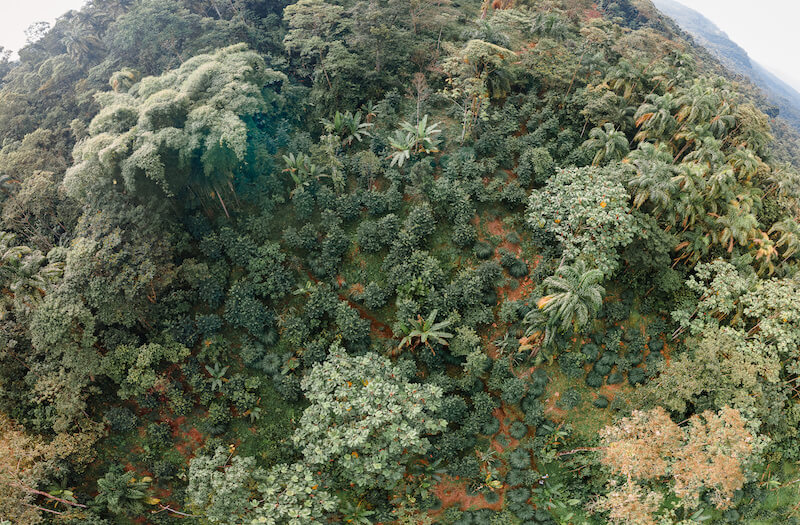
4. The cultivation of organic Guayusa
Our Organic Guayusa tea plays a special role in biological cultural management. Our Guayusa comes from the depths of the Amazon rainforest, and is grown there in permacultures that imitate the rainforest or are integrated directly into it.
The Kichwa inhabitantswith which we for the organic Guayusa Coopate cultivation, know every part of your forest gardens. In these so -called chakras grow next to Guayusa For example, also bananas, maniok, corn, cocoa, herbs, coffee and tobacco, but also dozens of other plants that attract birds and bees, produce special floor qualities or keep pests away.
No pesticides and hardly any fertilizer are needed, since the life cycle is so quickly assumed that short -lived plants are quickly available again as a nutrient for durable plants.
In this way, the Kichwa-Native residents have in addition to the income from the sale of Guayusa Also the possibility to generate further income through the sale of organic cocoa, organic bananas etc., as well as to supply yourself with food.
5. Bio Guayusa - Our organic certificate
The organic Guayusa from GUYA is traditionally grown in the chakras according to EU organic guidelines. However, the culture far exceeds the EU organic standards, since we operate holistically in the sense of a permaculture.
In addition, the farmers will be 30 percent more for their Guayusa paid when the Fair Trade Price officially sets. For our lemon grass we even pay 3 times and for our coffee, 4 times. Interview with farmers and documentation about the cultivation of Guayusa You can find on our Youtube channel.
After Guayusa has been certified in Ecuador, but must not yet be sold everywhere as a organic food. The importing company, in the case GUYA, must also undergo control. This control ensures compliance with guidelines for storing and processing. The controlling area for GUYA is the Abcert.
If you have any questions about biological cultivation or sustainable and fair production from our organic Guayusa Tea have, just write us on Facebook, email or Instagram.
If you have organic GUYA Guayusa buy want, look in our onlineShop or on Amazon over. If you would like to find our products in your local supermarket, say the branch manager on site and give them our contact details that you find.
Sources:
- https://www.ucsusa.org/food_and_agriculture/our-failing-food-system/industrial-agriculture/hidden-costs-of-industrial.html#.WuXInS_5xuU
- https://de.wikipedia.org/wiki/Integrierte_Produktion
- https://de.wikipedia.org/wiki/Integrierte_Produktion
- http://www.kob-bavendorf.de/arbeitsbereiche/Lagerung/systemvergleich-bio-ip
- http://www.daserste.de/information/wissen-kultur/w-wie-wissen/permakultur-100.html
